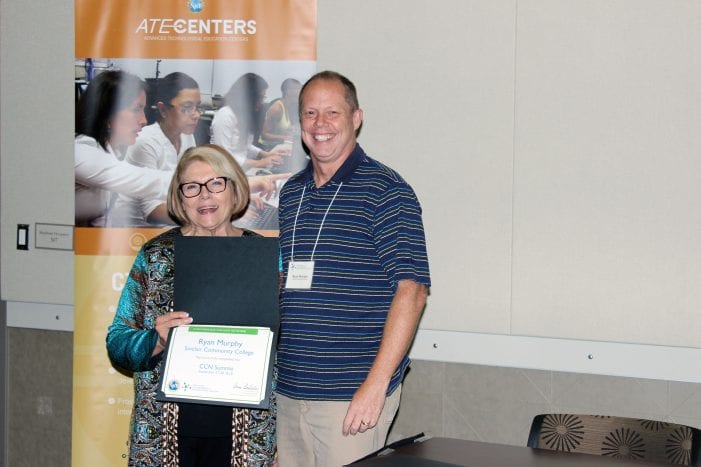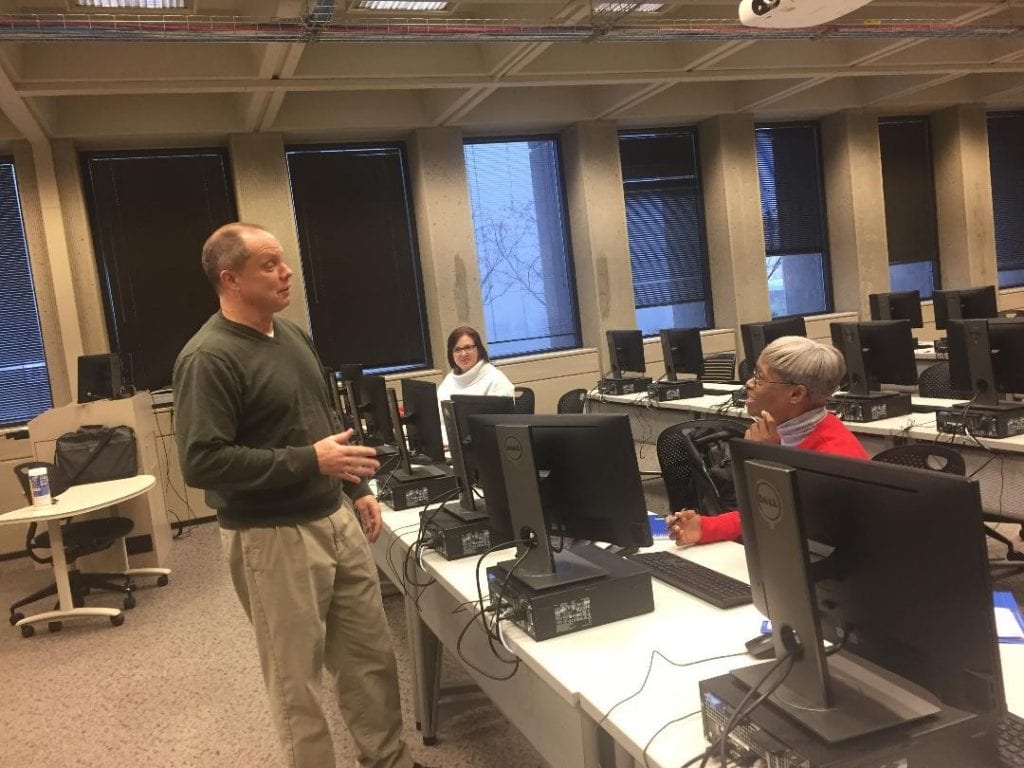CCN Focus: Ryan Murphy, Sinclair Community College

Dr. Ann Beheler pictured here with Ryan Murphy at the Convergence College Network 2018 Summit.
As a part of the National Convergence Technology Center (CTC) featured blogs, we would like to introduce to you some of our professors and instructors in the Convergence College Network (CCN) community. The CCN is a select cohort of community colleges and universities from across the country that connects IT educators with a wealth of resources to enhance their programs. In this week’s Q&A blog, we’re featuring Ryan Murphy, Professor of Business Information Systems, at Sinclair Community College in Dayton, OH.
What do you teach? I teach a variety of courses – I teach standard Microsoft Office applications; I teach fundamental software testing; and I teach database design.
How long have you been a teacher? I started at Sinclair in 2001, I’m in my 18th year.
What sparked your interest in teaching? Interestingly, I started off as a math major to be a teacher in the early 80’s and decided to change to business because I wanted a job that paid better. I started teaching part-time at Sinclair and found out that I liked that better than my real job so I was lucky enough to get a full-time job there.
What is the secret to successfully teaching IT to students? There’re two things in my opinion, first, you have to make it something that they can relate to. Secondly, you have to know your audience. What I mean by that is you have to know the students’ various levels of skill. Typically in our classes, we have some students that come in that know a lot of what we’re going to cover, or they catch on quickly. But then, you also have students who need a lot of help. So, I think it’s important to make sure you’re not leaving people behind, but not boring the people that already have a grasp on what you’re doing, which is easier said than done sometimes. What seems to work best for me is doing small group projects in class. I find that if I demonstrate something for more than 20 minutes, I start to lose their attention (even if I have them follow along actively participating). So, I usually try to introduce a concept for 10 or 15 minutes and then do a group project. After the first few weeks, when you figure out who’s who, I try to pair people that have more knowledge with some that don’t have as much. This gives the higher achievers an opportunity to help other students, which I believe is an excellent skill for students to develop.

Ryan Murphy speaking to students at Sinclair Community College in Dayton, OH.
What’s the biggest challenge of teaching IT? The disparity in skills within a collection of students in the classroom. Trying to teach a class where a lower-skilled student has to take the course, but inhibits the class from moving forward is certainly one of the biggest challenges I face. It would be great if students all came in with a higher baseline of knowledge, then you could spend more time on the fun/challenging topics. Unfortunately, I have to spend more time on the fundamentals.
Have you always been a teacher? If you had a job in industry prior to teaching what was it? I was an HR manager at Panasonic and also at Champion Papers. I was a loan officer at Norwest Mortgage, which was later bought out by Wells Fargo.
How has the CCN helped you? Networking, meeting people from various areas in terms of knowledge and location. We’re just scratching the surface of trying to implement the BILT and a new program that we’re developing which I think is going to be very helpful. Kyle Jones is the chair of our Computer Information’s Systems, which focuses on Cyber, Software Development and Networking. I work in the Business Information Department; we focus on Microsoft Office, Software Testing and Customer Service. I go between both departments to some degree. In my department, we need some help with the advisory board and this BILT model is going to help us immensely.
What advice would you give a new college joining the CCN? Make a connection with someone and pick their brain because there’s so much to learn. Don’t be afraid to ask.
How do you see the IT landscape changing in the next 5 years? I think we’re going to see further expansion of cyber and data analytics. Those two things are going to continue to balloon and I believe AI will become huge just a bit further down the road.
